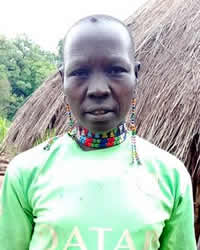The Central Koma, also known as the Komo, live in the Blue Nile Province of Ethiopia. They additionally live in the nation of South Sudan, as well as portions of Sudan. Considered as Nilotic people, the people live along the banks of the Upper Nile Valley River. This present-day term is used in a broader sense, as people who live in the surrounding areas and have the same physical, linguistic, and cultural characteristics are also considered to be Nilotic.
Cultural and linguistic changes among the Komo occur due to the tribespeople s intermarriages and close friendship contact with some non-Nilotes. Thus, while most Nilotes speak a language from the Sudanic linguistic stock, the Komo speak a language that belongs to the Koman language group.
The Komo work as shepherds and farmers. They raise cattle, sheep and goats. Their crops include sorghum, maize, sesame, okra, peppers, cotton and tobacco. The Koma engage in activities such as hunting and fishing, while also trading with the Nuer and other nearby people groups. The men hunt and fish and complete most of the duties of herding and milking animals, while the women help the men with other farm labor responsibilities. The women also collect honey from the hives in the bush.
The Komo live in compact villages, in round huts with thatched roofs. Each wife has her own hut where she and her children remain until the children mature enough to begin their own families.
Komo marriages take place by the exchange of sisters from one village to the next. Marriage between close relatives remains forbidden. The groom remains free from performing a bride service (working for the bride's family before a marriage can take place as some other cultures require), and a bride price remains uncommon. Only wealthy Komo men can afford more than one wife.
A headman in each village (or a small group of villages) inherits his office and the exercises, considered then as "the Father of the Land." Although families clear and cultivate the fields, individual families do not own the land. Instead, the land collectively belongs to the entire village, under the leadership of the headman. The headman only keeps the symbolic insignia of the Komo, such as strings of beads, spears and village drums, in his direct possession.
"Rain-makers" (men who conduct rituals in order to bring much needed rain) also inherit their positions and may sometimes serve as village headmen. In addition, each village benefits from a religious expert who specializes in magic and receives inspiration from spirits.
There are a few schools within the Blue Nile Province, so some Komo receive an education. In certain schools, higher-level students receive their instruction in English, while primary-learning students receive their instruction in Arabic. Few medical facilities remain operatable in the area, so the people rely upon their chiefs for the healing of simple illnesses.
Most Komo follow traditional ethnic religious practices. Their initial beliefs include worship of a supreme god as the creator of all things, followed by worship of the spirits of dead ancestors. Divination (the use of supernatural powers), magic and rain-making comprise the traditional religion s practices.
The Komo lack access to Christian resources and do not benefit from hearing a clear presentation of the gospel of Christ. Prayer remains a necessity among all believers, so the Komo develop receptive hearts to receive the gospel with the presented message.
Pray for the Lord to send Christian doctors and other laborers to share the gospel with the Komo people.
Pray that soon there will be Komo disciples developing the rise of other believers.
Pray for spiritual hunger to arise within Komo family leaders to follow Christ and draw others to him.
Scripture Prayers for the Komo in Ethiopia.
https://en.wikipedia.org/wiki/Komo_people_(Democratic_Republic_of_the_Congo)
https://www.101lasttribes.com/tribes/kwama.html
| Profile Source: Joshua Project |











